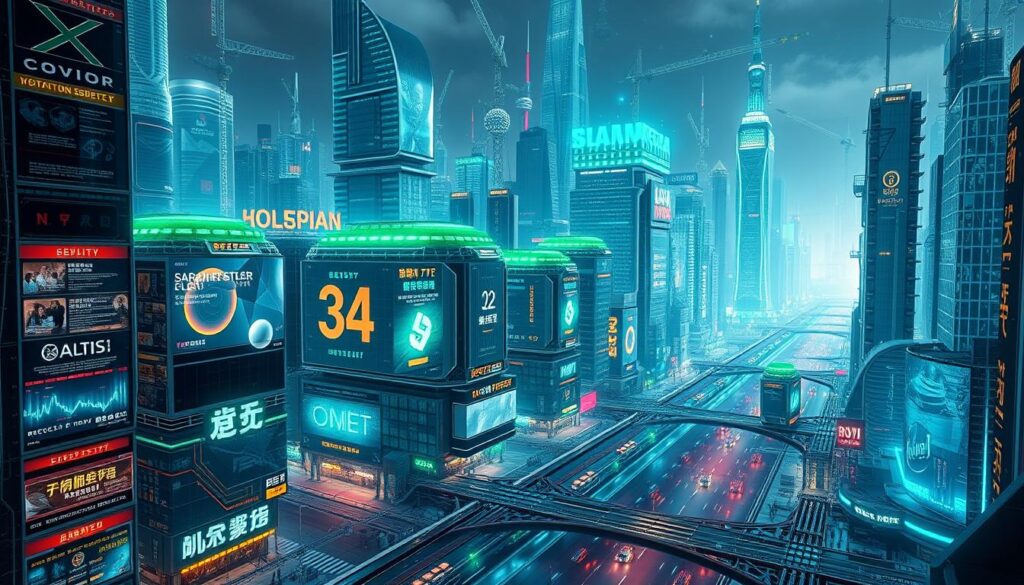The digital economy is changing fast, thanks to new tech. It’s changing how we talk, work, and find information. Innovation is key, always pushing for new ideas and ways to do things better.
Since 2000, research on innovation in the digital economy has grown by 22.75% each year. This shows how much we’re focusing on new tech and ways to do business1.
The COVID-19 pandemic made things even faster. Now, more people work from home, shop online, and watch movies digitally1. Sites like Amazon and Facebook have changed how we shop and talk to each other1.
Tools like Zoom and PayPal have also changed how we work and pay for things1. Netflix and Spotify have changed how we watch and listen to media1.
Uber and Airbnb have made sharing things easier, changing old ways of doing things1. New tech like AI and 5G are making things even better, connecting us more and making data analysis easier1.
tech innovations

Key Takeaways
- The digital economy is transforming industries and consumer behaviors through innovative technologies and business models.
- The COVID-19 pandemic has accelerated the growth of the digital economy, leading to a surge in remote work, online shopping, telemedicine, and digital entertainment.
- E-commerce, social media, remote work tools, digital payments, and streaming services have reshaped various industries and consumer experiences.
- Emerging technologies, such as AI, 5G, and blockchain, are further driving innovation and growth in the digital economy.
- The digital economy’s impact on high-quality economic development and productivity is significant, as evidenced by research.
The Rise of the Digital Economy and Its Innovation Engine
The digital economy has grown a lot in recent years. The spread of the internet, mobile devices, and cloud computing has made a lively ecosystem. This ecosystem lets businesses and people connect easily. It has made innovation key to economic growth2.
New technologies have changed old industries, bringing new chances and problems. For example, Tesla’s work on electric cars has changed the car world,2 and Airbnb has changed hotels by letting people rent out homes.2 Also, Amazon has changed shopping by making it online and improving delivery.2
The digital economy is now a big innovation engine, pushing progress in many fields3. Since 2000, there’s been a huge 22.75% annual growth in innovation research in the digital economy.2 This growth has changed industries, made things more efficient, and helped the environment.

The digital economy is always changing, needing new technological advancements. Improvements in green energy and renewable resources have made things better and more sustainable. This helps both the economy and the environment grow together3.
As the digital economy continues to grow, innovation will become increasingly important. Leaders and policymakers must work together to ensure that technological advancement continues in a way that benefits everyone.
Tech Innovations, Impact of Technology, Digital Economy
New technologies are changing the digital economy a lot. Artificial intelligence (AI) and machine learning (ML) are making big changes in many fields. They help with things like chatbots for better customer service and algorithms that spot fraud4.
The Internet of Things (IoT) connects lots of devices, making a huge network. This network gives us lots of data to use for better experiences and to keep things running smoothly4.
With more data coming in, big data analytics tools are key. They help businesses make better ads, improve products, and stay ahead4. Blockchain technology is also making things better by adding more security and making things clearer4.
The sharing economy is changing how we do business. It connects people and makes it easier to share things4. FinTech companies are also making a big impact. They offer new ways to handle money and help more people get financial help4.
“The digital economy is no longer a separate sector, but the foundation of our modern economic system.” – Klaus Schwab, Founder and Executive Chairman of the World Economic Forum5.
As the digital economy keeps growing, using these new technologies will be key. It will help businesses stay ahead and grow in a good way5.

Trends Shaping Innovation in the Digital Realm
The digital economy is seeing big changes thanks to new technologies. Artificial Intelligence (AI) and Machine Learning (ML) are changing how businesses work. They help make decisions based on data and offer personalized services6.
Large language models are getting better fast. They can now handle prompts that are much longer. This is helping generative AI grow, with more money going into it than other tech areas6.
Internet of Things (IoT), big data, and analytics are making things more efficient. Blockchain is changing finance, helping the fintech and sharing economy grow6.
New tech is changing how businesses and people work. Online platforms and remote jobs are opening up new chances for everyone6. But, there are also challenges like skills gaps and unequal tech benefits7.
We need to work together to solve these problems. By supporting innovation and adapting, we can make the digital world better for everyone7.
“The digital economy is a powerful engine of innovation, transforming industries and empowering individuals. However, we must work together to address the challenges and ensure that the benefits of technology are accessible to all.”
The Impact of Innovation on the Digital Economy
The digital economy has grown fast, thanks to innovation. New tech has opened doors for better efficiency, productivity, and customer service8. By 2019, the Internet had reached 88% of people worldwide, a big jump from before8. China also made a big leap in innovation, moving up 10 spots in the Global Innovation Index to 12th in 20218.
But, the digital world also brings challenges. Ethical worries about bias, transparency, and data privacy in AI and data tools need strong rules for their use8. The digital gap, caused by unequal tech access, can make things worse9. We must work on making tech more accessible and teaching people how to use it for everyone to grow together.
Also, as the digital world gets bigger, so does the risk of cyber attacks9. We need everyone to work together to keep the digital space safe. And, with AI and automation changing jobs, we must help workers get the skills they need for the future.
“China proposed the development of the digital economy as the main path for innovative growth, and is vigorously promoting innovation to implement sustainable development goals.”8
Digital innovation can bring huge benefits, but we must tackle these challenges. This way, we can make sure the digital economy helps everyone, not just a few.
Conclusion
The digital economy is always changing, with innovation leading the way. Technologies like AI, IoT, blockchain, and big data analytics are creating new solutions. These changes are reshaping industries10.
China’s digital economy has grown a lot, from 2.6 trillion yuan in 2005 to 45.5 trillion yuan in 2021. Its share of GDP has also increased, showing the power of these innovations10.
The metaverse, a virtual world, could change how we interact and work online. We also need to focus on making the digital economy sustainable. This includes using energy-efficient data centers and designing technology with the environment in mind11.
Technological progress and social issues like income inequality are linked. We need smart policies to use innovation for good and avoid problems11.
Innovation is becoming more open, thanks to platforms, citizen science, and innovation hubs. This opens doors for more people to get involved in creating new ideas. It could lead to a richer digital economy and shape its future11.
As the digital economy grows, tech innovations will keep driving change. They will lead to progress, disruption, and big changes in society for years to come.
FAQ
What are the key trends shaping the digital economy?
The digital economy is changing fast. We see more artificial intelligence (AI) and machine learning (ML). The Internet of Things (IoT) is growing too. Big data analytics, blockchain, and the sharing economy are also big trends.
FinTech is transforming financial services. These changes are making our world more connected and efficient.
How is innovation driving the growth of the digital economy?
Innovation is key to the digital economy’s growth. New technologies, business models, and approaches are emerging. They make our lives better and create new markets.
Since 2000, research on digital economy innovation has grown by 22.75% each year. This shows how fast things are changing.
What are the potential benefits of digital innovation?
Digital innovation brings many benefits. It makes things more efficient and personal. It opens up new markets and ways of doing business.
It also gives people and businesses more power. They can learn online, work from anywhere, and access financial services easily.
What are the challenges associated with digital innovation?
Digital innovation comes with challenges. There are ethical issues with AI and data. The digital divide means not everyone has equal access to technology.
Automation and AI might replace jobs. We also need strong cybersecurity to keep our information safe.
How is the future of the digital economy shaped by emerging technologies?
The future of the digital economy looks exciting. Technologies like AI, IoT, blockchain, and big data will keep getting better. They will help us solve big problems.
The metaverse, a virtual world, could change how we interact online. Sustainable practices and open-source innovation will also shape the future.
Source Links
- What is the Digital Economy? | Definition from TechTarget
- The Innovation Engine: Powering Growth in the Digital Economy
- The impact of technological innovation on the green digital economy and development strategies
- The Impact of Digital Technologies | United Nations
- Research on the impact of digital technology applications on firms’ dual innovation in the digital economy context – Scientific Reports
- McKinsey technology trends outlook 2024
- How digital transformation is driving economic change
- The Impact of the Digital Economy on Innovation: New Evidence from Panel Threshold Model
- The impact of digital economy on regional technological innovation capability: An analysis based on China’s provincial panel data
- Bridging the digital divide: the impact of technological innovation on income inequality and human interactions – Humanities and Social Sciences Communications

